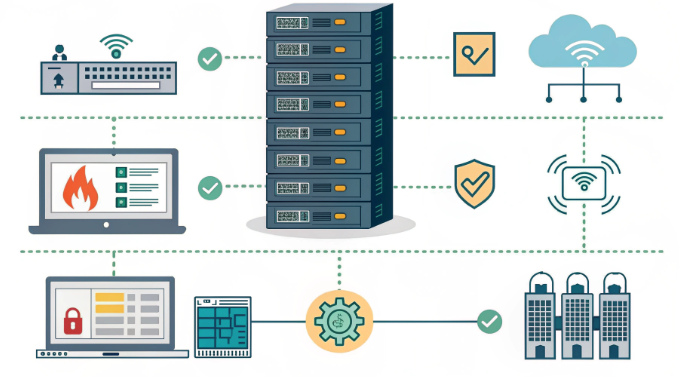Methods for IP Blocking and Access Control on US Servers

In today’s digital landscape, implementing robust IP blocking and access control mechanisms on US servers has become crucial for maintaining cybersecurity. With cyber threats evolving at an unprecedented rate and attacks becoming increasingly sophisticated, protecting your server infrastructure is more important than ever. Whether you’re managing a hosting environment or maintaining colocation services, understanding these security measures can significantly enhance your server’s defense against unauthorized access, DDoS attacks, brute force attempts, and other potential threats.
1. Implementing IP Blocking with Linux Iptables
Iptables remains the cornerstone of Linux firewall security, offering granular control over network traffic. This powerful tool enables system administrators to establish comprehensive access control policies. Its versatility allows for complex rule chains and stateful packet inspection, making it an indispensable tool for network security.
- Basic syntax for blocking individual IPs:
iptables -A INPUT -s xxx.xxx.xxx.xxx -j DROPThis command immediately blocks all incoming traffic from the specified IP address, providing instant protection against known threats.
- Blocking IP ranges:
iptables -A INPUT -s xxx.xxx.xxx.0/24 -j DROPUseful for blocking entire subnets associated with malicious activity or geographical regions known for cyber attacks.
- Allowing specific ports while maintaining blocks:
iptables -A INPUT -p tcp --dport 80 -j ACCEPTEssential for maintaining web service availability while enforcing security policies.
2. Apache Server Access Control Configuration
Apache’s .htaccess configuration provides flexible options for implementing access control at directory and file levels. This method is particularly effective for shared hosting environments where granular access control is essential. Modern Apache configurations can also integrate with external authentication systems and security modules for enhanced protection.
<Directory "/var/www/html/admin">
Order Deny,Allow
Deny from all
Allow from 192.168.1.0/24
# Additional security headers
Header set X-Frame-Options "SAMEORIGIN"
Header set X-XSS-Protection "1; mode=block"
Header set X-Content-Type-Options "nosniff"
</Directory>
3. Nginx Access Control Implementation
Nginx offers efficient IP blocking mechanisms through its http_access_module, providing both performance and security benefits. Its event-driven architecture makes it particularly effective at handling multiple connections while maintaining security policies, making it ideal for high-traffic environments.
- Basic location block configuration:
location / { deny 192.168.1.1; allow 192.168.1.0/24; deny all; # Advanced security headers add_header X-Frame-Options "SAMEORIGIN" always; add_header X-XSS-Protection "1; mode=block" always; add_header X-Content-Type-Options "nosniff" always; } - Implementing country-based blocking using GeoIP modules
- Rate limiting configuration with sophisticated burst control mechanisms
4. Advanced TCP Wrapper Implementation
TCP Wrappers provide an additional layer of security through hosts.allow and hosts.deny configurations, offering systematic access control at the service level. While considered legacy technology by some, TCP Wrappers remain valuable in environments requiring host-based access control with minimal performance impact.
# hosts.allow configuration example:
sshd: 192.168.1., 10.0.0. : ALLOW
ALL: LOCAL, .trusted-domain.com
# Logging configuration
vsftpd: ALL : ALLOW : spawn /usr/bin/logger -p auth.info
# hosts.deny implementation:
ALL: ALL
5. Control Panel Security Management
Modern hosting control panels offer intuitive interfaces for managing IP-based security measures. These comprehensive solutions provide robust security features while simplifying administration tasks.
- WHM/cPanel Security Features:
- IP Deny Manager with automated blocklist updates
- CSF firewall configuration with real-time monitoring
- ModSecurity rules management with custom rule sets
- Brute force protection with adaptive thresholds
- Plesk Security Tools:
- Fail2Ban integration with customizable jail configurations
- Web application firewall with advanced rule sets
- Server-wide IP blocking with geographical filtering
- SSL/TLS management with automated renewal
6. Automated Security Enhancement Tools
Implementing automated security tools significantly enhances your server’s defensive capabilities while reducing administrative overhead. These tools provide continuous monitoring and automatic response to security threats.
- Fail2Ban Configuration:
[sshd] enabled = true port = ssh filter = sshd logpath = /var/log/auth.log maxretry = 3 bantime = 3600 findtime = 600 - DDoS Mitigation Settings:
- TCP SYN cookie protection with adaptive thresholds
- Connection rate limiting with burst allowance
- UDP flood protection with packet filtering
- Layer 7 DDoS protection with request analysis
Best Practices and Recommendations
To maximize the effectiveness of your IP blocking strategy, consider these essential practices:
- Regular security audit implementation
- Weekly vulnerability assessments
- Monthly penetration testing
- Quarterly security policy reviews
- Maintaining updated blocklists
- Automated threat intelligence feeds
- Regular blocklist validation
- Custom blocklist management
- Implementing proper logging mechanisms
- Centralized log management
- Real-time log analysis
- Log retention policies
- Creating automated backup systems
- Incremental backup scheduling
- Offsite backup storage
- Backup encryption protocols
For optimal server security in the US hosting environment, combining multiple layers of IP blocking and access control methods provides the most robust protection. Remember to regularly update your security policies and monitor system logs for potential security incidents. Whether you’re managing dedicated hosting or colocation services, these IP blocking methods form the foundation of a comprehensive security strategy that adapts to emerging threats while maintaining service availability.

